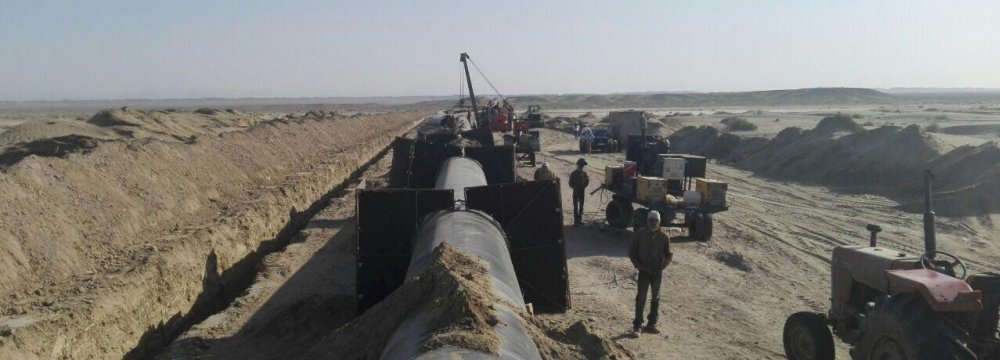
Iran Ready to Develop Onshore Section of Gas Pipeline to Oman

In February last year, Tehran and Muscat signed a preliminary agreement on the pipeline project that is estimated to cost $1.2 billion. But the venture is still at an embryonic stage.
Based on an earlier agreement in 2013, Oman would take in 28 mcm/d of gas from Iran for 15 years. The two nations hope the gas flow will begin by 2020, Shana reported.
"Based on negotiations between Tehran and Muscat, Iran will carry out the onshore section [of the gas pipeline] and we are ready to begin works," Hamidreza Araqi was also quoted as saying on Saturday.
Plans call for stretching existing pipeline infrastructure by nearly 200 kilometers to transfer gas from the port city of Asalouyeh in the Persian Gulf to Kuhmobarak, Hormozgan Province by the Sea of Oman. From there, a subsea pipeline will be laid to Oman's Sohar Port.
According to IRNA, the sultanate could import as much as 20 billion cubic meters a year of Iranian gas, or more than 50 mcm/d, to meet its demand.
The pipeline will circumvent the maritime boundary of the UAE "because the emiratis will not allow the pipeline to be laid in their territorial waters", according to Oil Minister Bijan Namdar Zanganeh.
The decision means the pipeline will be laid on parts of the Sea of Oman, which could go deeper than planned. The pipeline may be laid close to 1,000 meters below the sea's surface instead of the shallower UAE waters at around 300 meters.
Political tension between Iran and Saudi Arabia in recent years has also soured relations between Tehran and Manama, a close ally of the kingdom.
Potential Partners
International oil and gas firms, including Total, Royal Dutch Shell, South Korea's KOGAS, Mitsui & Co. of Japan and German firms Uniper SE and E.ON SE, could be involved in the gas venture, according to an official at the National Iranian Oil Company.
Russia, Iran's political ally and an increasingly close economic partner, could also help with the development plan.
NIOC chief Ali Kardor said last month that Iran is interested in Gazprom’s participation in the Iran-Oman gas pipeline.
"There has been huge interest [between NIOC and Gazprom] in the prospects of the joint construction of Iran-Pakistan-India and Iran-Oman gas pipelines," Kardor told Russian news agency Sputnik.
In November, Gazprom and NIOC signed a memorandum of understanding, which opened the way to a study into the prospects of cooperation in the development of gas fields in Iran, gas transportation and monetization.
Iran produces more than 800 million cubic meters of gas per day, but exports a fractional amount—around 40 mcm/d—to Turkey and Russia. The country holds the world's largest gas reserves after Russia.


Trump weighs using $2 billion in CHIPS Act funding for critical minerals

Codelco cuts 2025 copper forecast after El Teniente mine collapse

Electra converts debt, launches $30M raise to jumpstart stalled cobalt refinery

Barrick’s Reko Diq in line for $410M ADB backing

Abcourt readies Sleeping Giant mill to pour first gold since 2014

Nevada army depot to serve as base for first US strategic minerals stockpile

SQM boosts lithium supply plans as prices flick higher

Viridis unveils 200Mt initial reserve for Brazil rare earth project

Tailings could meet much of US critical mineral demand – study

Kyrgyzstan kicks off underground gold mining at Kumtor

Kyrgyzstan kicks off underground gold mining at Kumtor

KoBold Metals granted lithium exploration rights in Congo

Freeport Indonesia to wrap up Gresik plant repairs by early September

Energy Fuels soars on Vulcan Elements partnership

Northern Dynasty sticks to proposal in battle to lift Pebble mine veto

Giustra-backed mining firm teams up with informal miners in Colombia

Critical Metals signs agreement to supply rare earth to US government-funded facility

China extends rare earth controls to imported material

Galan Lithium proceeds with $13M financing for Argentina project

Kyrgyzstan kicks off underground gold mining at Kumtor

Freeport Indonesia to wrap up Gresik plant repairs by early September

Energy Fuels soars on Vulcan Elements partnership

Northern Dynasty sticks to proposal in battle to lift Pebble mine veto

Giustra-backed mining firm teams up with informal miners in Colombia

Critical Metals signs agreement to supply rare earth to US government-funded facility

China extends rare earth controls to imported material

Galan Lithium proceeds with $13M financing for Argentina project

Silver price touches $39 as market weighs rate cut outlook

















